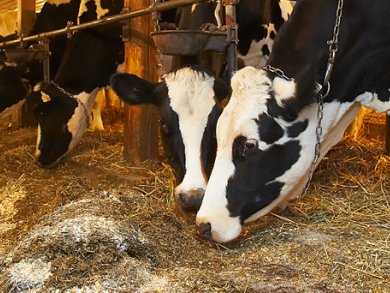Grains such as barley can be fermented into ethanol for biofuel production. As a side product, dried grains for animal feed are produced. Fungal pathogens in the grain can result in mycotoxins, particularly deoxynivalenol (DON), in the animal feed. Even low levels of ca. 5 ppm DON are toxic to animals.
David Schmale and co-workers, Virginia Tech, USA, have developed a transgenic yeast that reduces the amount of DON produced during fermentation by up to 55 %. The two key genes were indentified as trichothecene 3-O-acetyltransferases FgTRI101 and FfTRI201. These were cloned and expressed in yeast. During fermentation with the modified yeast, these genes were instrumental in converting DON to the less toxic 3-acetyldeoxynivalenol, thereby lowering the amount of DON in the resulting feed.
Ethanol yields were not affected and this strategy could be applied to other fuel ethanol crops such as corn, wheat and sugarcane.
- Conversion of deoxynivalenol to 3-acetyldeoxynivalenol in barley derived fuel ethanol co-products with yeast expressing trichothecene 3-O-acetyltransferases
P. A Khatibi, J. Montanti, N. P Nghiem, K. B Hicks, G. Berger, W. S Brooks, C. A Griffey, D. G Schmale,
Biotechnology for Biofuels 2011, 4(26).
DOI: 10.1186/1754-6834-4-26




